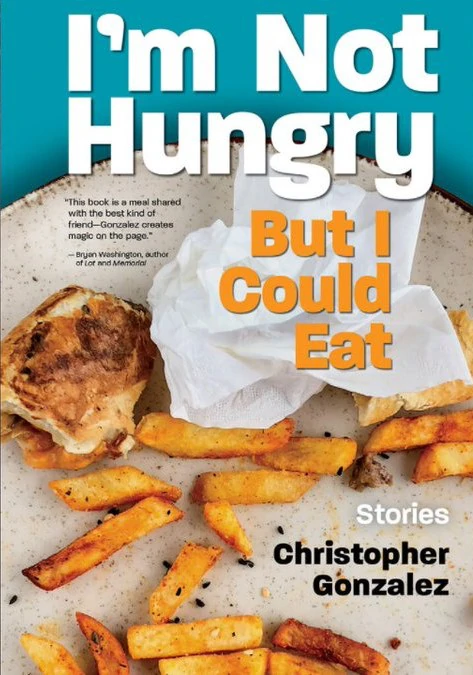
A review of I’m Not Hungry But I Could Eat by Christopher Gonzalez
Words By Asmaani Kumar
Published December 1, 2021 by Santa Fe Writers Project.
What drew me to Christopher Gonzalez’s debut short-story collection I’m Not Hungry But I Could Eat was how it seamlessly plotted hunger and identity by intertwining the themes of longing and cravings. Where does a craving for food end and longing for another begin? By centering each encounter of these queer Puerto-Rican men on food, Gonzalez hones in on the uncertain, turbulent moments that manifest in their lives. And all of these choices stem from the visceral need to connect with one another and to build on that relationship or sometimes step away from it.
This collection is heartfelt, humorous, and chaotic—each a very real depiction of the imperfections that make us human. Gonzalez follows the train of thoughts of each character with such credibility that you can’t help but find a bit of yourself in every episode, in the wild range of emotions that are captured on these pages. Each story is accorded its own unique identity in the way it’s written. Gonzalez also employs a lot of inventive writing patterns. In “What You Missed While I Was Watching the Cat,” you won’t find a clear plotline but rather an odd recollection of the narrator’s thoughts as they engaged in a lot of questionable, yet chaotic, action in their friend’s home that they were asked to look after.
“Here’s the Situation” is unique in the way the entire story is broken down into mini-episodes with a cause-and-effect element, wherein Mateo first explains his friend Eduadro’s fling of messy relationships and hurtful breakups. The following story explains how Mateo reacted to the breakups or how one of Eduardo’s flings reacted and the decisions they took as a result of that breakup. However, my personal favorite is “Half Hearted,” which plays around with the question “How’s your heart?” It touches upon the emptiness, longing, desperation, and desire felt by Hector. He always feels weak and tired in the face of life, wondering if it’s his half-heart that brings him and those around him pain, which also makes it difficult for him to open up, to build and sustain relationships with people.
What I loved about Gonzalez’s work is how he lets his characters be who they are without passing any moral judgments; he touches upon the vast spectrum of people’s eccentricities with curiosity, enthusiasm, and so much acceptance. In “Little Moves”, you find Felix dancing in the middle of his living room while spilling the ashes of his long-gone sister. While in “Juan, Actually,” our two characters are on an adventure taking a hit-and-run victim (caused by their car) to the hospital.
Gonzalez’s characters do their best while reveling in their own skin on these pages, even though at times the outcomes of their actions aren’t necessarily what they expect. And while human relationships also take center stage along with a hunger for food and for others, there is so much thoughtfulness in the way the relationships a person builds impact their lives. What might appear as a short, light read ends up expressing the potential conflicts as well as the inherent tenderness that mark these relationships. In “That Version of You,” our narrator continues complaining about his friend throughout the story but never leaves his side, at the very end offering him half of his sandwich and recognizing how important this relationship is to him despite all the faults he finds. While in “I’m Not Hungry but I Could Eat”, the narrator continues stuffing himself with food beyond his capacity to fulfill the simple need of lending his friend a listening ear. The narrator in “Unplucked,” who sets out to get new eyebrows sewn in, is consistently impacted by the words of judgment (or advice) offered by their friend, Sarah. “Enough for Two to Share” takes a different route by touching upon how family trauma plays out in who we become years later and what we seek in other people.
I’m Not Hungry But I Could Eat does not present itself as a neat collection of stories that can be captured within a singular theme. Instead, it subverts the tendencies of clear-cut narratives and vouches for itself as a fresh, unique, and inventive voice. Yes, it is about Puerto Rican men. Yes, it is about hunger. Yes, it does play around with the metaphor of food. But these can hardly capture the complexity of human emotions that Gonzalez has portrayed. It takes tenderness and a genuine love for the messiness of being helplessly human to write these stories. As a reader, it is a constant reminder of the diverse characters out there that we’re yet to encounter but at the same time, it’s a secret message to you: it’s okay to be who you are, to feel what you feel.